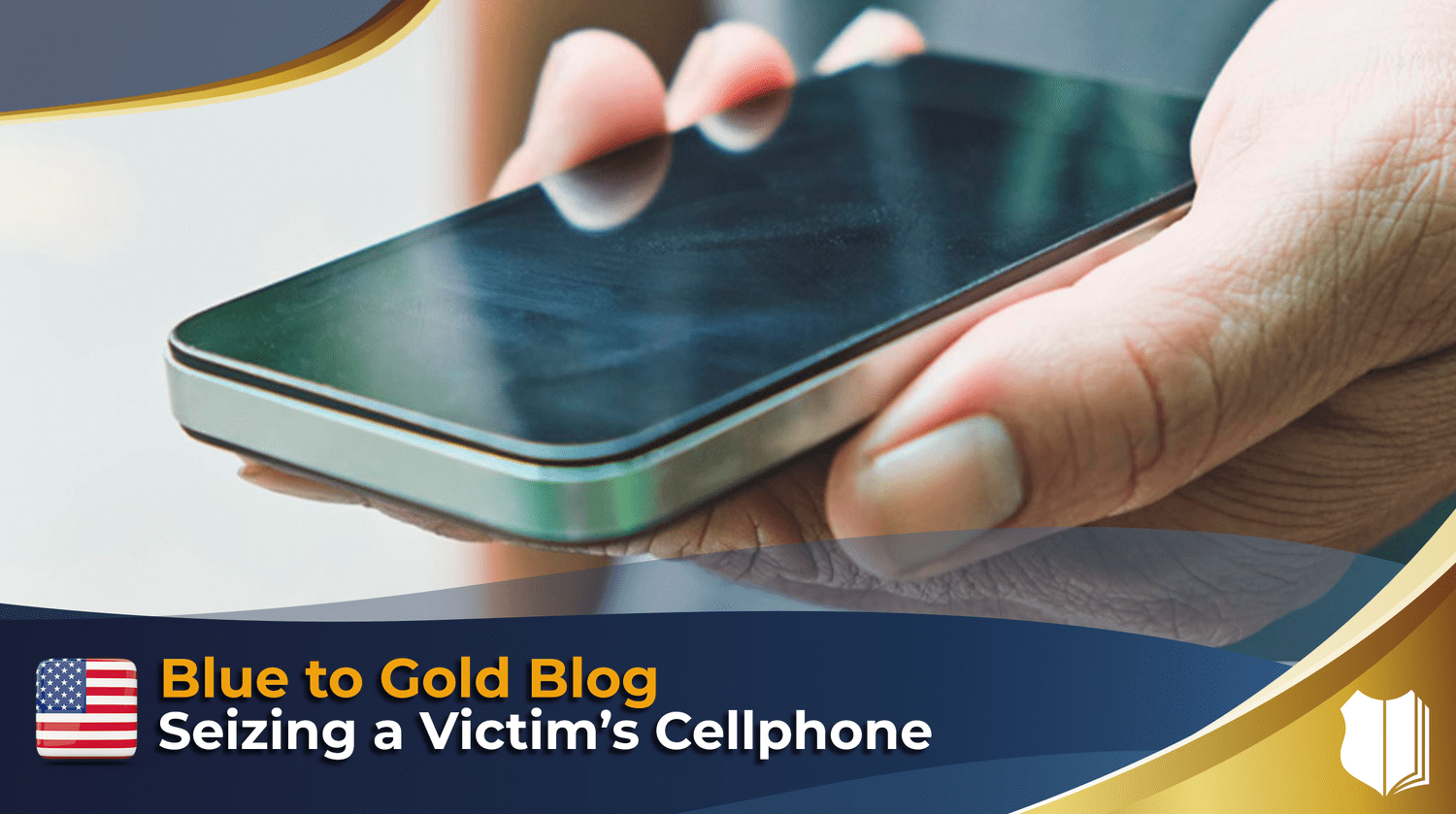The question: Can officers routinely seize a victim’s cell phone if they’re the victim of a drive by shooting?
He goes on to say, “Look, I’m an officer here, working at CHP. And we’ve had a lot of shootings that occur in my area, right? So we get out there, and we have some victims on-scene. And their vehicle has been shot out, maybe they’re shot, maybe they go to the hospital and so forth. It is our routine, to seize their cell phones, to get in and get a warrant and download the cell phone from the victims. Sometimes the cell phone is not searched until a while later. They also routinely seize the motor vehicle as evidence as well. What do you think about that?”
So basically, what’s going on here is when you seize a cell phone, it’s occurring under plain view. Plain view is a doctrine that allows you to seize something when you have probable cause to believe that it’s evidence or fruits of a crime.
Now, plain view doesn’t handle getting access to the items. So what I mean by that is, if you see a piece of evidence inside a car and you’re outside the car, and let’s say the car is in a parking lot, that’s plain view. But plain view doesn’t allow you to get into the car.
In order to get into the car, you need another doctrine. And use or exigency is going to be the motor vehicle exception. But the point is, plain view and plain view seizure are two different things. So if the officer is on-scene, and they believe that there’s evidence that can help solve this crime on the cell phone, then they are allowed to seize the cell phone under plain view. That is, if they have access to it, like they can see it in the person’s hand, and so forth. If the phone is inside a purse, then they need to also articulate exigency to grab the cell phone.
I also want to talk about; do we normally have probable cause on the drive-by shooting scenes and the victims? The answer is probably yes. But don’t think it’s automatic. So you have an investigator out there saying, “Hey, we get to just seize the victim’s cell phones as a matter of routine. That’s all you need. Because of the fact that they’re a victim, we can seize their cell phone.”
That is incorrect. When you seize somebody’s property, that’s a Fourth Amendment intrusion. And all Fourth Amendment intrusions have to be justified with consent, some kind of recognized exception, like plain view and exigency and so forth, or a warrant. So you can’t do it just because they’re the victim of a crime. It doesn’t make any sense.
So if you ask me, “Anthony, I seized Jane Doe’s phone. She was the victim of a drive by shooting. Was it lawful?” Before I can answer the question I have to ask you, “Why do you believe that there’s evidence of the shooting on Jane DOE’s phone? Why do you believe that information on that phone can help your investigation?
“Anthony, I believe that I can get location information because it’s unclear exactly where she was when the shooting occurred. And I can get that information because she called 911. After the shooting, she kept driving, she doesn’t quite know where the shooting occurred. Our detectives can get that location information from the phone, based on when the phone call was made.
If you talk like that, I say, “good.” That’s what I need to hear, right? Or they were recording something or they recorded the suspect vehicle. Just give me something more than, “Hey, we just do it as a matter of routine.”
Because the problem is that you may find evidence on the phone against the victim. Let’s say you find child porn and you charge that person. And now this defendant, the victim originally, but now the defendant, goes to court and puts you on the stand and says, “You had no reason, you had no probable cause to even seize my cell phone in the beginning. You just seized it because you were told to do that and you just do it as a of matter routine. Isn’t that true?”
Officer (you) says, “Yeah, that’s pretty much true. I didn’t have anything specific as to your phone at the time I seized it. I just seized it. That’s a problem for you.
You’ll say, “But Anthony, then if they go get a search warrant won’t the search warrant save the evidence?” Maybe. But If an appellate court believes that the search warrant was so facially invalid, that no reasonable officer would have believed that he had probable cause to begin with, then that defeats the search warrant. So just because you have a signature of a judge does not mean that it’s foolproof. you can still attack a search warrant, even though it is difficult. As far as seizing their cars, it sucks to be a victim of crime in California. You lose your phone, and you lose your car, right?
Look, if the detectives need that car and have a good reason for it, then it is what it is, right?
I actually have to tell you one more thing. The writer also talks about detaining these victims, or at least implies that these victims are not free to leave, until the investigators show up. I just want you to know that, constitutionally, you’re definitely allowed to freeze the scene and, render aid and see who the witnesses are, who the victims are. But at some point, you may have a victim who is like, “I’ve got to go, I’m late for work, or I’m going to miss my flight, I ain’t going to cooperate.” You can’t just detain these people against their will. They are not suspects in a crime.
Now, if you believe that they could be suspects, and they might be in a gang shooting, that’s a different story. Then you can have reasonable suspicion. But if you believe that they’re purely a victim, and they just don’t want to give a full statement right now and they want to leave, I have to tell you, constitutionally, what you’re supposed to do is identify them and let them go. Try to earn their cooperation, try to convince them that the best thing for keeping the community safe is their cooperation.
But look, I’m just telling you, there is no constitutional authority to detain a victim against their will. There is no legal authority in any state that says if you’re a victim of a crime, you don’t get to go anywhere. We get to keep you as long as we need to. That’s not how that works. So keep those things in mind as well.
So that’s pretty much what I have for you. Hopefully, it helps. Use good judgment here. All right, Guys, I hope this helps you get it right every single time. Keep the questions coming at: bluetogold.com/show.








